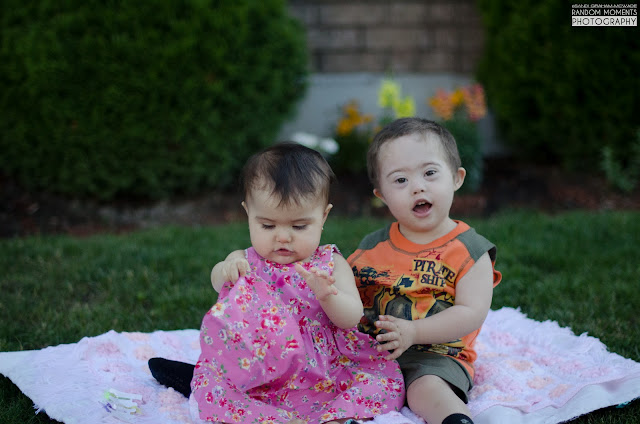What is Down syndrome?
The following article is written by Stephanie Mamayson for the Canadian Down syndrome Society. It accurately describes what Down syndrome is.
• Down syndrome is one of the leading clinical causes of delayed development in the world – it is not related to race, nationality, religion or socio-economic status.
• Approximately 80% of babies with Down syndrome are born to women under 30 years of age.
• 30% - 50% of the individuals with Down syndrome have heart defects and 8% - 12% have gastrointestinal tract abnormalities present at birth. Most of these defects are now correctable by surgery.
• There is wide variation in mental abilities, behaviour and physical development in individuals with Down syndrome. Each individual has his/her own unique personality, capabilities and talents.
• Individuals with Down syndrome benefit from loving homes, early intervention, education, appropriate medical care and positive public attitudes.
• Individuals with Down syndrome learn at different rates and benefit from inclusive classroom settings just like their peers.
• Increasingly people with Down syndrome are completing high school, gaining job skills, finding meaningful employment, pursuing post-secondary education, and getting married.
• The intentional strengthening of human connections in healthy, inclusive communities that nurture values of interdependence and practice natural forms of mutual support benefits people with Down syndrome as it does every Canadian.
• In adulthood, many persons with Down syndrome hold jobs, live independently and enjoy recreational opportunities in their communities.
• The Canadian Down Syndrome Society is a national non-profit organization dedicated to improving the lives of persons with Down syndrome.
10/24/02 - CDSS
To view the actual article click the following: What is Down syndrome (This is a Microsoft Word Document) or visit the CDSS page here.
Down syndrome, redefined
Down syndrome is a naturally occurring chromosomal arrangement that has always been a part of the human condition. The occurrence of Down syndrome is universal across racial and gender lines, and it is present in approximately one in 800 births in Canada.
Down syndrome is not a disease, disorder, defect or medical condition. It is inappropriate and offensive to refer to people with Down syndrome as "afflicted with" or "suffering from" it. Down syndrome itself does not require either treatment or prevention.
The sole characteristic shared by all persons with Down syndrome is the presence of extra genetic material associated with the 21st chromosome. The effects of that extra genetic material vary greatly from individual to individual. Persons with Down syndrome karyotypes may be predisposed to certain illnesses and medical conditions, but that genetic arrangement does not guarantee their development. The same illnesses and conditions are also present in the general population. Timely and accurate diagnosis and appropriate treatment of these illnesses and conditions improves both the length and quality of life, to the same extent as would be expected in the population without Down syndrome. Vigilance on the part of health care practitioners is required to identify and treat any of them if they arise.
Conversely, studies have shown that people with Down syndrome have a statistically lower risk of developing certain other illnesses and medical conditions. That genetic arrangement does not guarantee that they will not develop.
Down syndrome commonly results in an effect on learning style, although the differences are highly variable and individualistic, just as in the physical characteristics or health concerns. The most significant challenge is to find the most effective, productive methods of teaching each individual. The identification of the best methods of teaching each particular child ideally begins soon after birth, through early intervention programs.
Position Statement on Redefining Down Syndrome
Approved November 2003
Approved November 2003
FACTS ABOUT DOWN SYNDROME
• Down syndrome is the most common chromosomal abnormality occurring 1 in every 800 births. The exact cause is unknown.• Down syndrome is one of the leading clinical causes of delayed development in the world – it is not related to race, nationality, religion or socio-economic status.
• Approximately 80% of babies with Down syndrome are born to women under 30 years of age.
• 30% - 50% of the individuals with Down syndrome have heart defects and 8% - 12% have gastrointestinal tract abnormalities present at birth. Most of these defects are now correctable by surgery.
• There is wide variation in mental abilities, behaviour and physical development in individuals with Down syndrome. Each individual has his/her own unique personality, capabilities and talents.
• Individuals with Down syndrome benefit from loving homes, early intervention, education, appropriate medical care and positive public attitudes.
• Individuals with Down syndrome learn at different rates and benefit from inclusive classroom settings just like their peers.
• Increasingly people with Down syndrome are completing high school, gaining job skills, finding meaningful employment, pursuing post-secondary education, and getting married.
• The intentional strengthening of human connections in healthy, inclusive communities that nurture values of interdependence and practice natural forms of mutual support benefits people with Down syndrome as it does every Canadian.
• In adulthood, many persons with Down syndrome hold jobs, live independently and enjoy recreational opportunities in their communities.
• The Canadian Down Syndrome Society is a national non-profit organization dedicated to improving the lives of persons with Down syndrome.
10/24/02 - CDSS
To view the actual article click the following: What is Down syndrome (This is a Microsoft Word Document) or visit the CDSS page here.
